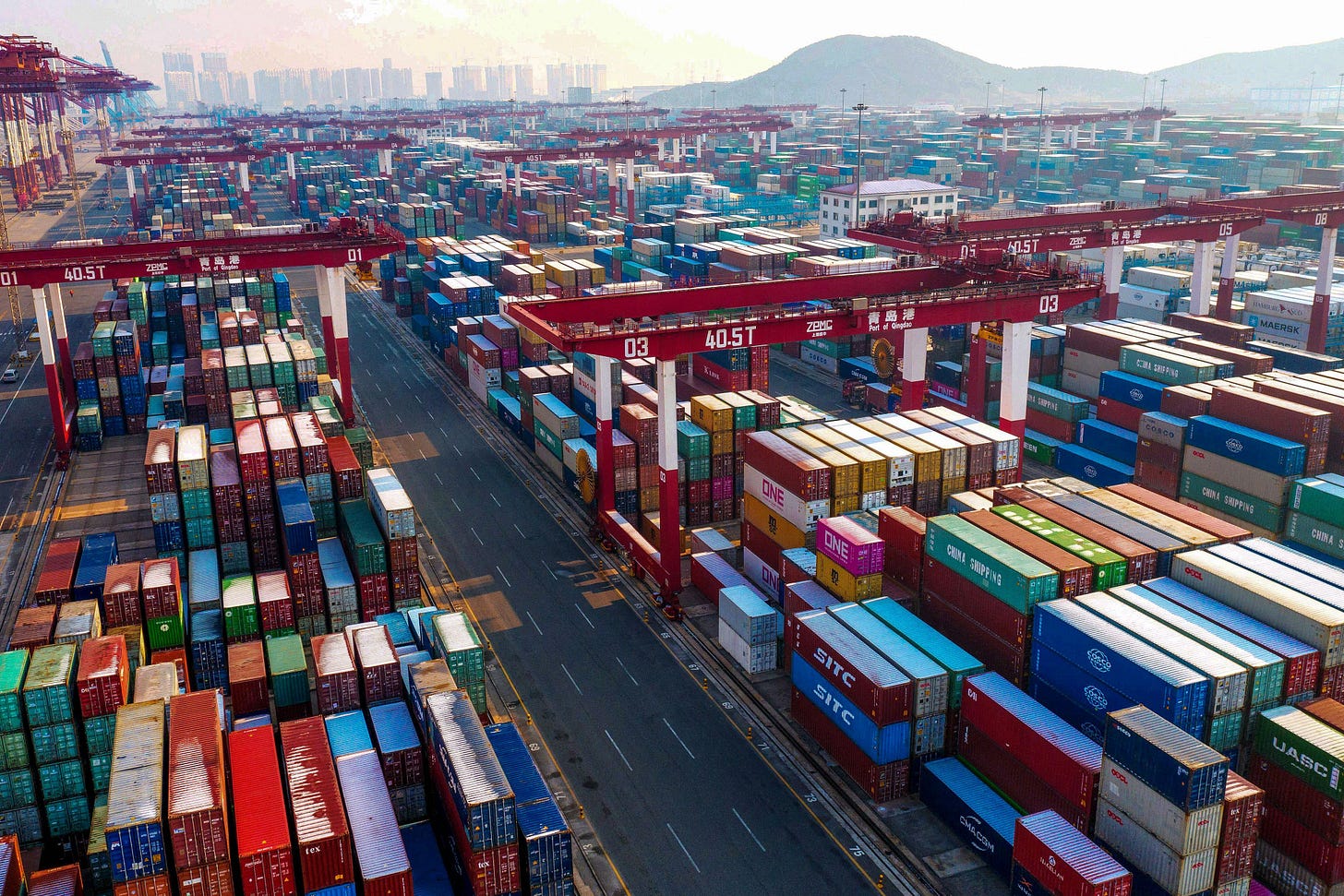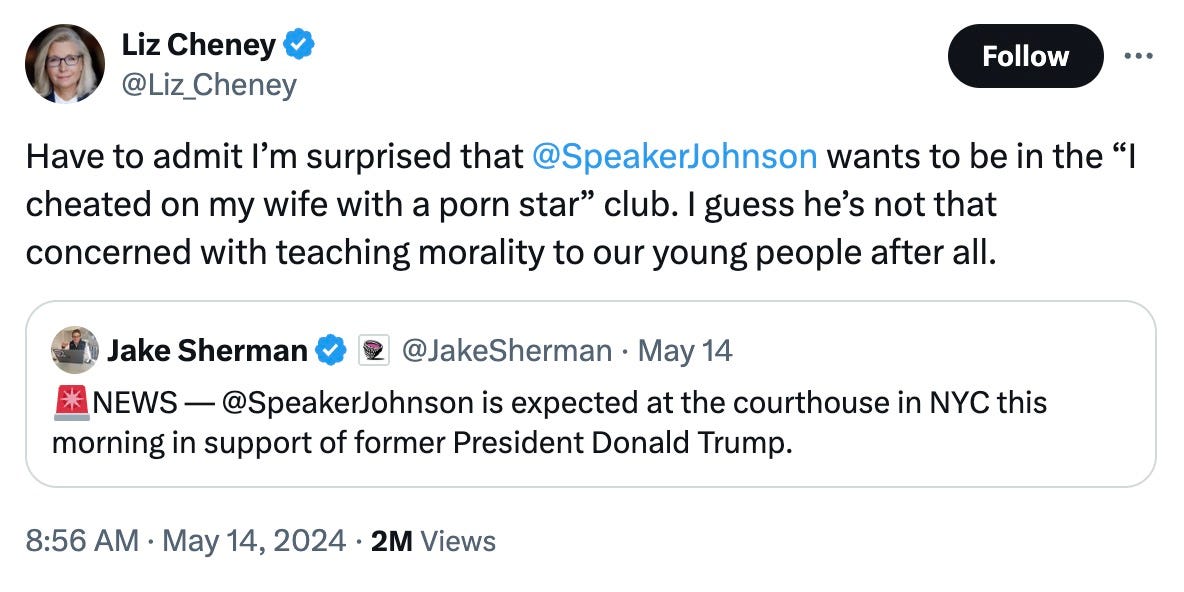The Trade War Will Continue Until Morale Improves
Plus: How far can Democrats press their advantage on abortion?
A few interesting pieces of news out of last night’s batch of primaries: Prince George’s County executive Angela Alsobrooks defeated Rep. David Trone in Maryland’s Democratic Senate primary, and will face former Gov. Larry Hogan in what will be a closely watched race this November.
Meanwhile, the ghost of Nikki Haley is still pulling significant numbers in the suburbs: Haley broke 30 percent in the GOP primary in suburban Montgomery County, Maryland, and took 23 percent in Douglas County, Nebraska, where Omaha is. Happy Wednesday.

Everybody’s a Protectionist Now
Back in 2019, as Donald Trump was sinking deeper and deeper into the mire of his no-exit trade war with China, then-candidate Joe Biden was clear about the costs. “President Trump may think he’s being tough on China. All that he’s delivered as a consequence of that is American farmers, manufacturers and consumers losing and paying more,” Biden said in a speech that July. “His economic decision-making is so shortsighted—as shortsighted as the rest of his foreign policy.”
As president, though, Biden has quietly maintained Trump’s China tariffs. And this week, he’s doubling down, slapping massive new tariffs on Chinese electric vehicles, semiconductors, and steel and aluminum exports.
“President Biden has consistently been clear that he will take action to defend American workers and businesses from the unfair trade practices of the People’s Republic of China,” U.S. Trade Representative Katherine Tai told reporters yesterday. “Today, he is once again keeping that promise.”
Biden—like Trump before him—is correct that China habitually engages in all sorts of bad-faith economic practices, from forced technology transfer to cyber theft. But economists agree with the 2019 version of Biden that the primary consequence of tariffs are fewer American jobs and higher American prices. And if more than five years of Trump’s tariffs didn’t succeed in bullying China out of those practices, why should we expect Biden’s to be any different?
Right now, the U.S. economy is strong in many respects: The job market is tight and markets are way, way up. But inflation remains the fly in the ointment—and a huge political danger for Biden. If he loses in November, the rising costs of nearly everything during his term will be a major reason why.
And yet when it comes to inflationary protectionism, we’re going into the election with just two choices on offer: Heavy protectionism, or protectionism the likes of which hasn’t been seen since before the Civil War.
Because make no mistake: Biden may be conducting himself on trade like a souped-up version of Trump circa 2019, but that’s nothing compared to what Trump’s promising if he’s reelected this time. Trump has ridiculously denounced Biden’s trade policy, a mirror of his own while last in office, as a “pro-China economic program” that “puts America last” and is “killing our country.” And he’s proposed an eye-popping set of new trade actions, including a “universal baseline tariff” on nearly all foreign imports, a ban on U.S. investment in China, and “a 4-year plan to phase out all Chinese imports of essential goods.”
“President Trump’s trade policy is firmly rooted in American history,” his campaign brags on its “Agenda 47” website. “America used to impose tariffs on over 95 percent of all imports, and for decades the federal government took in over 80 percent of its revenue by taxing foreign producers through tariffs.”
That “for decades” claim is true: America did exactly that, between 1820 and 1860.
If additional tariffs will exacerbate the single economic issue that Americans say they’re maddest about, why are both Trump and Biden so gung-ho about them? Put simply—and we as voters say this to you, our voting readers, with all love—because voters are huge morons about them. It’s easy to shine a spotlight on protectionism’s supposed beneficiaries—announce your new steel tariffs at a steel manufacturing plant, say you’re determined to stick up for American workers like nobody before, and soak up the applause from the hard-hatted crowd. Then you just count on people not to notice the diffuse costs of the ensuing drag on the economy—after all, that could be for any number of reasons, right?
Trump’s first-term tariffs on metals, washing machines, and other goods from China, a study last year found, actually had a negative impact on U.S. manufacturing jobs. But although the trade war hurt American workers, it helped Trump win their votes: “People living in areas affected by the tariffs—particularly the Midwest, the area around the Great Lakes, and the South—became more likely to vote to reelect Mr. Trump in 2020. They also became less likely to identify as Democrats and more likely to elect Republicans to Congress.”
—Andrew Egger
Can Abortion Save Democracy?
Just six months out from November, Donald Trump consistently leads in swing state polling against President Biden. And he consistently leads Biden on the issues voters prioritize—the economy and jobs, inflation, and immigration. Biden leads consistently on just two issues: abortion and democracy. Moreover, those of us who believe Biden must be reelected to stop Trump’s planned assault on democracy are in the minority. It’s abortion policy, not democracy, that motivates the greater share of future Biden voters.
In the latest New York Times/Siena poll, out this week, 21 percent of voters said the state of the economy would be their number-one deciding issue going into this election. The next biggest group, at 12 percent, said immigration; abortion was third with 11 percent. Just five percent said their biggest issue was “the state of democracy/corruption.”
But Biden’s advantage on abortion is only 11 percentage points. On the question of who is most responsible for the overturning of Roe v. Wade, 20 percent of respondents think Trump bore “some responsibility” and 36 percent thought he bore “a lot of responsibility” for a grand total of only 56 percent. And—sit down for this—nearly 20 percent think Biden is to blame.
The poll found 64 percent believe abortion should be legal versus 27 percent who don’t, which is consistent with most other polls. So abortion remains a liability for Republicans, who are haunted by the 2022 midterms when it stopped a red wave. With nine percent inflation, the issue of abortion was overall the second-most important issue to voters in 2022. It was the number one issue in Pennsylvania.
But will the post-Dobbs energy remain as high in 2024 as it was in 2022? Do voters buy Trump’s attempts to blunt the issue, and believe his assurances that he won’t pursue a federal ban if elected?
Democrats have to hope that abortion not only energizes swing voters in this first presidential election in post-Roe America, but that there will also be new abortion swing voters—people who feel conflicted about the issue but ultimately break in favor of legal access. A Pew survey released this week found that while 54 percent of respondents agree that “the decision about whether to have an abortion should belong solely to the woman,” 32 percent said that they also thought that “human life begins at conception so an embryo is a person with rights.”
Some of these voters will feel strongly enough about abortion to vote against Republicans. But Democrats will have to be strategic about where they try to mine these voters for victories. It’d likely be fools gold, for example, for the Biden campaign to invest heavily in red Florida, even though Sunshine staters will be voting on an abortion initiative on the same ballot. Plenty of voters there will side with Democrats on abortion and still pick Trump for president.
Those resources should be used instead in Arizona, a true battleground where abortion is also on the ballot. After the state supreme court ruled in April that an 1864 abortion ban could be enforced, Democrats rushed to repeal the ban and—with much private pressure from GOP donors and public pressure from Trump himself—two Republicans joined them.
Arizona Democrats will, of course, remind voters of what all the Republicans in the state legislature, minus two, wanted to inflict on women. But the crisis has been resolved, and the urgency has passed.
Democrats, strange as it may seem, have more work to do to educate voters on just who ushered in the end of Roe and what the consequences have been. The party may be on the right side of gun control, health care costs, climate, election subversion, and insurrection. But those issues won’t motivate the majority of voters on the margins in critical battlegrounds. Democrats have only one salient issue in this election. The constitutional order—and ultimately the international order as well—may depend on their ability to lock voters in on it.
—A.B. Stoddard
Catching up . . .
Biden proposes June and September faceoffs with Trump, ditching debate commission: Washington Post
White House worries Russia’s momentum is changing trajectory of Ukraine war: New York Times
Inflation improved slightly in April, with timing for rate cuts still uncertain: Washington Post
Bibi’s rant: Israel isn’t a ‘vassal state’ of the U.S.: Axios
AIPAC-backed Sarah Elfreth wins primary for open Maryland congressional seat: Politico
Nikki Haley gathers her donors and ignores Trump: Politico
Walmart’s reign as America’s biggest retailer is under threat: Wall Street Journal
Quick Hits: ‘The Sycophants Are Lining Up’
Speaking of the vast gulf between the first term Trump had and the second one he’s hoping to get, Mona Charen has a bracing piece up at the site today. “Those who are soothing themselves that a second Trump presidency wouldn’t be so bad are recalling the first term incorrectly,” she writes:
The reason Trump was unable to order that border crossers be shot in the legs, or that the IRS conduct audits of his foes, or that the United States withdraw from NATO, or that the military shoot rioters after George Floyd’s murder, or that the Justice Department lie about election results, or any of the myriad other crimes, outrages, or stupidities the former president contemplated was that his own hires talked him out of things or slow-walked them until Trump’s goldfish attention turned elsewhere.
In a second term, those officials would be gone. As his former chief of staff John Kelly put it, “The lesson the former president learned from his first term is don’t put guys like me . . . in those jobs. The lesson he learned was to find sycophants.”
Those sycophants are lining up. Applicants to work at the Republican National Committee right now must aver that the 2020 election was stolen. The whole party must be a cult. How much worse will it be if the cult leader is crowned with success by the voters? The Republicans who were brave enough to resist Trump’s illegal, immoral, and unconstitutional demands the first time around will be loath to reprise their acts if perceived “enemies of the state” are being audited by the IRS, harassed by the FBI, indicted by a Trumpified DOJ, or worse.
The foreign policy implications of electing Trump are just as frightening. He disrupted key American alliances in NATO and East Asia in his first term, but would destroy them in a second term. Without the U.S. security guarantee, nations around the globe would rush to acquire their own nuclear stockpiles. Trump would reward Putin’s aggression by abandoning Ukraine, which would whet Putin’s appetite for the Baltics, Xi’s appetite for Taiwan, and God only knows what other aggressors’ plans.
Those are the stakes. It is tragic and shameful that so many fail to see it.





A long time ago, the great David Frum wrote that "Velociraptors have now figured out how to open the doors". (the difference between a first and second Trump term) This is a very condensed version of Mona's piece today.
The 20% of people that believe Joe Biden is responsible for the end of Roe: we should be able to call them stupid. Because they truly are stupid.